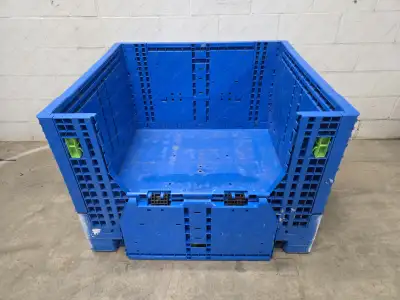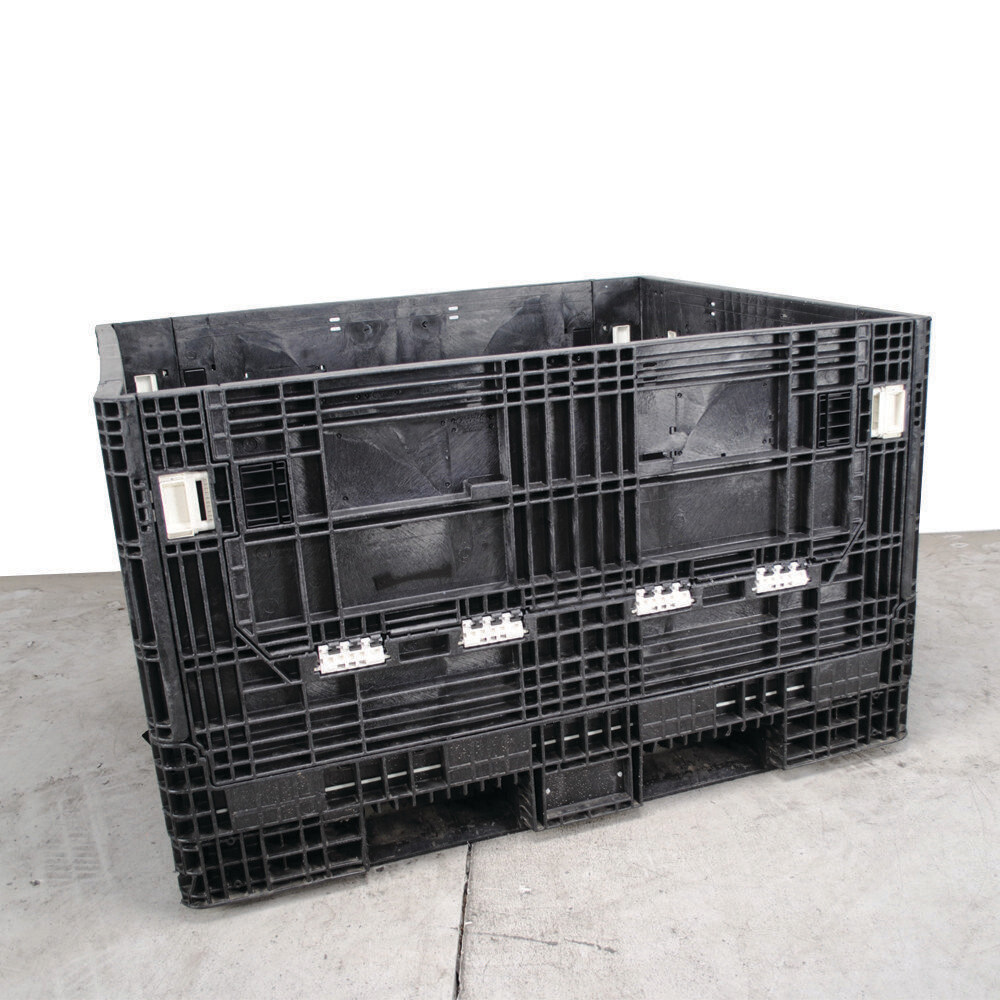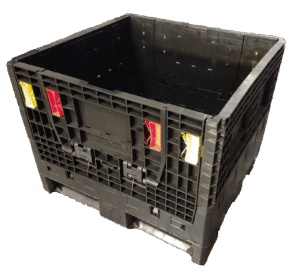Why Mass Containers Are Crucial for Economical and lasting Transportation
Mass containers play a vital role in contemporary logistics. They assist in the effective movement of big amounts of goods, thereby maximizing transport processes. This technique not only reduces costs however additionally lessens environmental impact with reduced exhausts and waste generation. As markets look for more lasting practices, the adoption of bulk containers is coming to be progressively considerable. What effects does this shift hold for future logistics and supply chain monitoring?

The Advantages of Using Bulk Containers in Logistics
Bulk containers transform logistics by boosting effectiveness and sustainability. These containers enable the transport of big quantities of goods in a single trip, considerably decreasing the number of journeys called for. This not just simplifies procedures however likewise reduces labor expenses connected with handling, packing, and dumping. Additionally, mass containers are made to maximize space use within transportation automobiles, guaranteeing that even more products can be shipped simultaneously.
The standardization of bulk containers additionally simplifies the logistics procedure. With consistent dimensions, they can be quickly stacked and kept, leading to improved warehouse management. Bulk containers usually feature durable materials that shield contents from damages during transportation, consequently reducing product loss and boosting general reliability. Therefore, services can experience improved supply chain efficiency, ultimately bring about enhanced success and consumer complete satisfaction. This mix of factors makes mass containers an essential property in modern logistics.
Ecological Impact: Reducing Waste and Carbon Impact
As markets progressively prioritize sustainability, the adoption of bulk containers has become an essential approach for minimizing waste and reducing carbon impacts. These containers lessen using product packaging products, such as boxes and plastic, consequently significantly decreasing total waste generation. By combining deliveries, mass containers enhance transport performance, permitting more products to be moved per journey. This decrease in trips straight correlates with reduced greenhouse gas exhausts, adding to a smaller carbon footprint.
Bulk containers can commonly be recycled or recycled, better minimizing ecological influence. The resilience of these containers warranties they can endure multiple transportation cycles, lowering the requirement for single-use options. used bulk containers. By improving logistics and promoting effective source use, bulk containers not only sustain lasting techniques yet additionally urge industries to line up with worldwide ecological goals. Eventually, their application shows a commitment to environmental stewardship and accountable source monitoring
Cost Cost Savings: Exactly How Mass Containers Lower Transport Expenses
While many companies seek means to improve their lower line, the usage of bulk containers offers a considerable possibility for reducing transportation costs. Mass containers make best use of the quantity of items transported, permitting organizations to ship larger amounts at as soon as. This effectiveness minimizes the variety of trips called for, straight reducing fuel prices and decreasing labor costs connected with loading and unloading.
In addition, bulk containers typically feature structured styles that optimize area usage within transportation automobiles. This indicates fewer vacant rooms, causing extra efficient use offered capacity. In addition, the resilience of bulk containers can lower the threat of product damages throughout transit, ensuring and minimizing losses that more products arrive intact.
Enhancing Supply Chain Efficiency With Bulk Storage Space Solutions
Mass storage options play an important duty in improving supply chain effectiveness by enhancing inventory management. By combining items into less, larger containers, companies can significantly minimize dealing with expenses associated with frequent transfers and processing. This structured technique enables for far better monitoring and monitoring of stock, ultimately resulting in improved functional performance.
Structured Supply Monitoring
Effective inventory administration is crucial for maximizing supply chain operations, particularly when organizations adopt bulk storage solutions. These services allow services to keep greater stock levels while lessening the regularity of replenishment. By consolidating materials into mass containers, business can improve their stock processes, reducing the intricacy linked with tracking several smaller packages. This strategy promotes precise stock matters and enhances projecting accuracy, allowing for even more educated decision-making. Additionally, bulk storage remedies simplify storage facility organization, making it simpler to locate and accessibility items when needed. Because of this, organizations can achieve a much more efficient supply turnover price, inevitably improving total supply chain performance and reducing the likelihood of stockouts or overstock situations.

Minimized Handling Prices
The implementation of bulk storage space remedies not only enhances supply management however additionally considerably minimizes managing prices throughout the supply chain. By combining products right into bulk containers, companies minimize the requirement for frequent handling and transfer in between different storage and transportation units. This method reduces down on labor expenses connected with loading, dumping, and moving smaller plans. In addition, mass storage space decreases the regularity of shipments, bring about lower transport costs and lowered gas usage. Because of this, services can maximize their logistics procedures, permitting for an extra efficient allotment of resources. Eventually, minimized managing expenses add to improved general supply chain effectiveness, fostering an environment that sustains both sustainability and financial feasibility.

Flexibility of Bulk Containers Throughout Various Industries
Many markets have distinct needs for transport and storage, mass containers have actually arised as a flexible solution that meets a broad variety of requirements. These containers, varying from large bins to specialized containers, can fit diverse products, consisting of powders, granules, and liquids. In the farming sector, bulk containers assist in the transportation of plant foods and grains, while the food and beverage market utilizes them for ingredients and finished products. The chemical industry relies upon bulk containers for safely delivering unsafe products, ensuring compliance with security guidelines. Furthermore, building and construction companies take advantage of mass containers for moving accumulations and other materials. Their flexibility encompasses different modes of transportation, consisting of ships, trains, and vehicles, enhancing logistical performance. This adaptability not just enhances operations throughout different fields but additionally website advertises sustainability by reducing product packaging waste and enhancing space in transportation. Consequently, mass containers play an important function in modern supply chain monitoring.
Future Fads wholesale Container Use and Sustainability
The future of mass container usage is progressively shaped by cutting-edge materials development that boosts sustainability. Additionally, automation in logistics promises to improve procedures, lowering waste and boosting effectiveness. Welcoming round economy techniques will certainly better change how bulk containers are developed, utilized, and recycled, promoting a more lasting transportation landscape.
Cutting-edge Materials Advancement
As industries significantly prioritize sustainability, ingenious products growth wholesale containers arises as a substantial element in improving environmentally friendly transport options. Researchers and producers are discovering eco-friendly plastics, recycled compounds, and light-weight metals to reduce environmental influence. These materials not only minimize waste however likewise enhance gas performance by decreasing the overall weight of containers. Additionally, improvements in smart products, which can adjust to differing conditions, improve the toughness and capability of mass containers. The assimilation of these innovative materials straightens with round economy principles, advertising reuse and recycling. As the need for lasting techniques expands, the growth of such products will certainly play an essential duty fit the future of bulk container usage in logistics and transportation.
Automation in Logistics
Considerable improvements in automation are positioned to change logistics and the use of mass containers, boosting sustainability in transport. Automated systems, consisting of drones and independent vehicles, are improving the motion of bulk containers, lowering the reliance on traditional fuel-powered transport. These technologies enhance routing and filling procedures, enhancing and reducing vacant miles fuel efficiency. In addition, automated stock administration systems enhance monitoring and monitoring of mass containers, making certain much better resource appropriation and decreased waste. The integration of the Net of Points (IoT) permits real-time data evaluation, allowing aggressive decision-making that aligns with sustainability goals. As automation continues to develop, it is expected to drive better technologies wholesale container use, inevitably supporting even more sustainable logistics techniques and minimizing the environmental effect of transportation.
Round Economy Practices
Innovations in automation are establishing the phase for a much more integrated strategy to circular economic situation practices in the domain of mass container usage. As markets increasingly accept sustainability, mass containers are being designed for durability and reusability. This change not only reduces waste yet also enhances source performance. Companies are embracing approaches such as closed-loop systems, where utilized containers are gathered, refurbished, and reestablished into the supply chain. In addition, clever technologies track container life cycles, facilitating much better administration and reducing ecological influence. The cooperation in between manufacturers, logistics service providers, and end-users is crucial in developing standards for sustainable container use. used collapsible containers. Future fads show an expanding focus on materials that are recyclable and naturally degradable, additional enhancing the round economic situation's concepts wholesale transport

Often Asked Inquiries
What Materials Are Bulk Containers Commonly Made From?
Bulk containers are usually created from long lasting materials such as high-density polyethylene, cardboard, aluminum, and steel. These products provide toughness, convenience, and defense, making them suitable for delivering numerous items in different industries efficiently.
How Do I Choose the Right Size Bulk Container?
Choosing the best size bulk container entails evaluating the volume of materials to be delivered, thinking about managing equipment compatibility, and assessing storage area demands. Correct dimension guarantees efficiency in transport and decreases waste throughout delivery.
Are Mass Containers Reusable or Recyclable?
Bulk containers are typically recyclable, designed for multiple journeys, improving sustainability. Numerous can also be reused, depending upon the materials used. Choosing recyclable alternatives additionally decreases and sustains ecological goals waste in transport methods.
What Safety Rules Apply to Bulk Container Transportation?
Security guidelines for mass container transport consist of conformity with the Division of Transport guidelines, proper labeling of unsafe products, structural integrity assessments, and adherence to weight limits to ensure risk-free handling and prevent mishaps throughout transit.
How Can Companies Change to Using Bulk Containers Effectively?
Services can transform to bulk containers by examining current logistics, training team on handling, buying appropriate tools, optimizing stock management, and working together with distributors to ensure compatibility and performance throughout the supply chain.
As markets increasingly prioritize sustainability, the fostering of mass containers has emerged as a crucial strategy for decreasing waste and reducing carbon impacts. By consolidating materials into mass containers, firms can improve their stock procedures, minimizing the intricacy connected with tracking multiple smaller sized plans. As markets increasingly focus on sustainability, innovative products development in mass containers emerges as a substantial aspect in enhancing environment-friendly transportation solutions. Automated systems, including drones and self-governing automobiles, are simplifying the motion of bulk containers, minimizing the dependence on typical fuel-powered transportation. In addition, automated supply monitoring systems boost monitoring and surveillance of mass containers, ensuring better resource allocation and reduced waste.